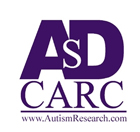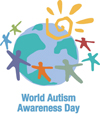 |
 |
Canadian Autism Researchers Celebrate World Autism Awareness Day |
The Autism Spectrum Disorders—Canadian-American Research Consortium (www.AutismResearch.com) celebrates the upcoming World Autism Awareness Day (April 2nd, 2011) by acknowledging the unique contributions and achievements of individuals on the spectrum and their families and caregivers around the world. We would also like to acknowledge the contribution and involvement of the thousands of families and individuals participating in our ASD research who share their first-hand experiences to make our work possible.
It is estimated that tens of millions of individuals are affected by autism world-wide. Most are living in countries where there is little or no access to treatment and public services. The World Health Organization (WHO) in its 2007 Global Burden of Disease report on mental and neurological disorders highlights the fact that traditional epidemiology has been greatly underestimating mental and neurological disorders by tracking only mortality, not disability rates. While it does not keep global statistics on ASD prevalence specifically, WHO estimates that these neurological disabilities account for almost 11 percent of global disease burden and are projected to rise to 14.7 percent by 2020.
The Centre for Disease Control’s (CDC’s) newest data show that an average of one in 110 children have an ASD. This is a prevalence rate of about one percent of all children. These results reflect data collected by CDC’s Autism and Developmental Disabilities Monitoring (ADDM) Network in multiple communities throughout the U.S. in 2006.
“We wish to celebrate those living with ASDs and their families and support workers”, says ASD-CARC Director Jeanette Holden. “The numbers are very important and alarmingly high but they do not tell the real-life stories of the children, youth, adults and seniors who courageously live with lifelong autism conditions. The statistics cannot capture the tremendous dedication, compassion, and ingenuity shown by the parents, siblings, extended family, clinicians, speech-language pathologists, psychologists, community support workers and the myriad of others who help to bring a better quality of life to those with these conditions”. Today we celebrate the entire Autism Community”.
There is now a solid body of research on the importance of early intervention and effective treatment and service practices for children and adults on the spectrum. However, far more emphasis is needed on diagnosis and seamless access to therapy, with support throughout the lifespan as needed. “Adults on the spectrum are being ignored or forgotten”, says Dr. Holden. “There are 2-3 generations of individuals with ASDs who have received no supports and whose families are struggling to provide for their uncertain futures. It won’t be long before the children who are currently being provided with preschool and early school supports join these ranks and they, too, will have no services or support, unless we start enhancing programs and service delivery for adults now. Parents who have looked after their children for 40-60 years and more, deserve some relief from being care-providers and from constant worry about the future”.
This occasion is also a time to reflect on the importance of world-wide investment in ongoing collaborative ASD research to broaden our current understanding of the complex realities of ASDs. Canadian funding for ASD science is noticeably modest by international standards. With over 300,000 Canadians living with ASD conditions, ASD-CARC encourages the federal government to ensure Canadian research leadership in this field by significantly increasing dedicated funding for autism-specific research. Targeted funding will reduce long-term health and social costs by accelerating Canadian research that holds great promise for building our understanding of autism and how to more effectively help people with ASDs across their lifespan.
Researchers play an active and essential role in ensuring the health and well-being of people with ASDs. Innovative and promising new research is focusing on the genetic and environmental causes of autism, the creation of extensive data sets, neurobiology of ASDs, psychological and developmental processes and comparative work on effective treatments and interventions. Increased knowledge sharing and collaboration among international researchers is bringing greater attention to ASD issues and contributes to reducing the severe barriers and disadvantages faced by many individuals with ASD conditions and their families in developing countries.
ASD-CARC is a multi-disciplinary
For more information please contact:
Dr. Jeanette Holden: autism.research@queensu.ca
Dr. Suzanne Lewis: aspirebc@cw.bc.ca
| SITE MAP STUDIES |
QUESTIONNAIRES
MY ACCOUNT
CONTACT US
| Q–GLO LOOKING FOR SOMETHING? |





